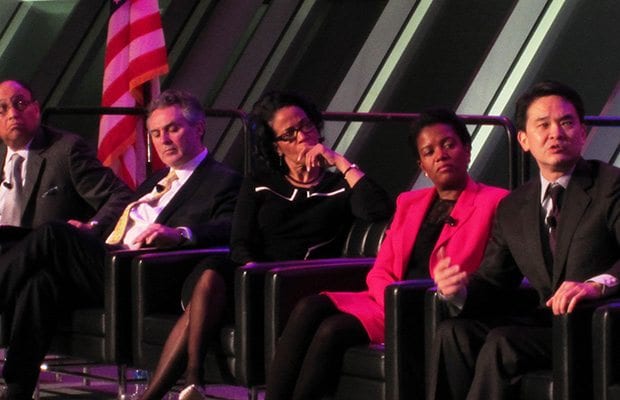
On Monday night the Boston Convention & Exhibition Center hosted a Black History Month community forum that featured an impressive panel of speakers examining how Boston can be more effective at providing economic development opportunities for businesses run by people of color. The biggest message was clear — talking about economic strategies is not enough, decisive business development action for minority-run businesses is needed.
Darryl Settles, president and founder of WiSe Urban Development and board member of the Massachusetts Convention Center Authority, set the tone for the evening with some daunting numbers.
He pointed out that Hispanic-owned business account for only one-tenth of 1 percent of all total business revenue in Massachusetts; African-American owned businesses account for only two-tenths of one percent of all total business revenue in the state. Most minority-owned businesses in the state are so small that only one in 10 have employees; and of all minority owned businesses in the state fewer than 1 percent have revenues of more than $1 million.
“This is disturbing and it is not about lack of smarts, it is not about lack of capability, it is the lack of opportunities,” Settles said. “I hope these compelling statistics have given you a broader perspective about why these issues need to be addressed.”
Harvard Business School Professor Steven Rogers led the discussion, which featured addresses by Sen. Edward Markey, D-Mass., and Mayor Marty Walsh. It also included a panel discussion with state Sen. Linda Dorcena-Forry, Boston Convention & Exhibition Center Chairman James Rooney, Boston Redevelopment Authority Director of Planning Kairos Shen, Taylor Smith Properties Chairman and Suffolk University Professor Richard Taylor and Roxbury Technologies CEO Beth Williams.
Harvard’s Rogers stressed that a thriving minority business community in a world-class city like Boston is essential.
“This is the great opportunity that Boston has and that is to make its minority business community the strongest in America. For this to happen there must be a partnership with the City of Boston, which is fast becoming a minority majority,” Rogers said. “The minority community has grown exponentially but sadly, while the minority population has grown dramatically, the city’s dollars spent with minority businesses has been embarrassingly low.”
Rogers estimates that Boston, which has a budget of about $2.6 billion, has spent less than 10 percent with minority businesses. He compares this to Chicago, which spent over 30 percent of its $8.3 billion budget with minority businesses in 2013.
According to Rogers, it is important for the city to do business with minority businesses for several reasons. The first is that it is the right thing to do. The second is that doing business with minority firms means the city is now accessing all of the “best and the brightest.” And, lastly, because minority business have been shown, above all others, to create more jobs for other minorities.
“The largest employer of minorities is the government. The second largest employer of minorities are minority-owned firms,” Rogers said. “Thus thriving, high-growth minority-owned firms are good for cities because they create jobs for other minorities.”
Sen. Markey’s message was one of Boston’s need to continue to break down barriers for entrepreneurs of color particularly to access to capital that can help drive their businesses forward.
“We have not come as far as we have to come if we are going to provide the economic opportunities that allow each and every person in our country to be able to maximize those God-given abilities, which they have,” Markey said.
Markey suggested a three-point plan for Boston to bolster economic development for minority businesses. The first is to give minority businesses access to capital. The second is to make sure that graduates from local colleges, especially minorities, stay in Boston to work. The third is to provide an educational workforce for minority-owned businesses that ensures a new generation of workers that can help move companies forward.
“We need to make sure that government programs designed to encourage minority businesses remain funded,” Sen. Markey said. “Boston is growing. It’s bubbling. It’s bursting. You can feel this incredible energy now in Boston. We have a chance now to put together a plan as we move forward in this next generation.”
Mayor Walsh called the forum on economic development for minority businesses a very important discussion and pledged the city’s support for such efforts.
“We are committed to making Boston inclusive in every area. It is a matter of basic justice and our economic success as a city depends upon it. We cannot reach our potential unless we use the talent of all of our people,” Walsh said. “The people cannot contribute fully unless they have a level playing field. The way to do that is by creating avenues of access in every neighborhood — access to government representation, to corporate leadership, to higher education, to business ownership, to jobs and home ownership.
“You are having an important dialogue about how we will develop the future,” Walsh added. “I am here to tell you that we as a city will be a devoted partner.”
Walsh restated his campaign pledge to have 50 percent of his cabinet people of color and to also have greater diversity at the department head level.
He also said that the city will work hard to drive economic opportunities beyond the city’s current business hubs and into Roxbury, Mattapan and Dorchester.
“In the end it is about empowering the entrepreneurial spirit that already exists in our communities. We will be proactive in reaching out to the businessmen and women of color and supporting their dreams. We will strengthen small businesses in all of our neighborhoods,” Walsh said. “The first step to supporting people is understanding the challenges they face. As I said on my first day I am here to listen, to learn and to lead. With your help we will make Boston a place where everyone can climb the ladder of economic success.”
State Sen. Forry made a call to action, acknowledging that talk and strategy is not enough. She said that politicians need to listen more closely to people of color who own businesses and find out the barriers they are facing when it comes to opportunity and growth and establish clear policies that remove these barriers.
“It can’t just end after today or be addressed only on Black History Month or on Martin Luther King’s birthday. We have to make a concerted effort to say this is a priority,” Forry said.
She said there are legislative initiatives that can be undertaken to help businesses of color thrive in Massachusetts and establishing these needs to be a priority as well as making sure that any legislation enacted is followed.
“We know we can file legislation, but if there is no enforcement or no oversight then it falls to the wayside,” Forry said. “We need to hold folks accountable. You need to hold us accountable and it is great that we are doing this today, but it can’t stop after this evening.
“In order to create real change there has to be a real public/private partnership, focused on diversity and creating access to economic wealth,” she added. “[And make sure] businesses are aware and knowledgeable about the process and what are the steps they need to take to participate.”
Roxbury Technologies’ Williams built on Forry’s call to action, but she also conveyed skepticism saying she has heard the promises in her decades of experience in the business world, but has seen little actual impact.
“I have been an entrepreneur for 11 years. I have had no government business,” Williams said.
She added that she is hoping with some new policies in place this will change.
“I think that we have a great opportunity right now and a great opportunity for us to support one another and really do call on our politicians that are here that they are going to step up because we are a minority majority city and we should be creating wealth in this city and have the same opportunities.”
Real estate developer and Suffolk Professor Taylor said he believes it will take a three- to five-year plan to see the city of Boston establish policies that will have an impact on the economic development of minority owned businesses.
For this economic impact to happen there needs to be a determined will by leadership to make it happen and a sustained mechanism to enact change, he said, calling out the Boston Chamber of Commerce in particular.
“The Chamber of Commerce in this town needs to get with the program,” Taylor said. “There are no black CEOs in this town. How are you going to tell [prospective minority professionals] that they should stay in our city past entry level jobs when there are no African Americans in the c-suites?”
Taylor concluded with remarks that he hopes Boston, and Mayor Walsh, can learn from Gov. Deval Patrick, who put in place significant minority leadership in his administration, which has driven policies that impact businesses and communities of color. He said he believes with a similar approach there will be an impact in Boston.







